Corbyn – the leading player or the laconic Fool?
In Shakespearean tragedy the Fool is often the wise head who sees what the serious players cannot see. In Shakespearean comedy the Fool often owns a tragic edge that peeps from behind the comic mask. In both cases he can speak truth unto power in a way not permitted to “serious” characters.
The Labour Party has chosen for its leader a man who has spent a long political career earnestly speaking what he believes to be home truths to the powerfully privileged who actually run stuff. In the course of a few months his supporters have cast him as The Doctor; as a Merlin or a Dumbledore; or as the Will Smith ‘Legend’. Corbyn’s victory has given him a chance to script his own starring role. Jeremy Corbyn is now a leading player. Will it be History, Comedy or Tragedy – will it all end well or will he be Labour’s love lost?
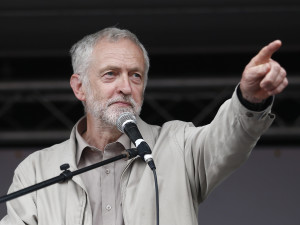 Jeremy Corbyn the classic political outsider has arrived at the centre of UK politics if he has not himself yet travelled to the political centre. He was elected Labour Leader by about 60% of the votes cast in the recent election – a total of around quarter of a million votes were cast directly for him. Earthquake; Tsunami – you choose – the similes of natural disaster abound. But catastrophes have rarely come in more prosaic disguise than the shambolic motley of the mildly spoken and earnest sounding Jeremy Corbyn. A vegetarian; a moralist; a humanitarian: the author of this event is as unlike the expected Messiah of the left as any might have imagined. Whilst many about him now holler and shout and whoop for joy – he stands aloof in sandals and shorts – as unfashionably out of step with the times as any sandalled Jeremiah might have been in his time. In the best Labour tradition Corbyn has more of more the whiff of Methodism than Marx in his political sermonising. He is serious; he can be puritanical and he can be tetchy. He is as unflashy as New Labour was glitz and glamour.
Jeremy Corbyn the classic political outsider has arrived at the centre of UK politics if he has not himself yet travelled to the political centre. He was elected Labour Leader by about 60% of the votes cast in the recent election – a total of around quarter of a million votes were cast directly for him. Earthquake; Tsunami – you choose – the similes of natural disaster abound. But catastrophes have rarely come in more prosaic disguise than the shambolic motley of the mildly spoken and earnest sounding Jeremy Corbyn. A vegetarian; a moralist; a humanitarian: the author of this event is as unlike the expected Messiah of the left as any might have imagined. Whilst many about him now holler and shout and whoop for joy – he stands aloof in sandals and shorts – as unfashionably out of step with the times as any sandalled Jeremiah might have been in his time. In the best Labour tradition Corbyn has more of more the whiff of Methodism than Marx in his political sermonising. He is serious; he can be puritanical and he can be tetchy. He is as unflashy as New Labour was glitz and glamour.
Corbyn has come upon the Labour Party leadership much as Senator George McGovern came upon the US Democratic Party presidential nomination in 1972 – from the far outside of the left field. Much like McGovern, Corbyn’s low-key manner has inspired an idealistic cadre of youthful adherents. Therein lies both his strength and his weakness. For those he has inspired are apt to believe in miracles – and his election goes some way to justify their belief. The problem is there is scant evidence that beyond those happy few true believers that Jeremy Corbyn will have a wider appeal. It is always too tempting not to make early easy judgements. Good sense says – wait and see – but for what it is worth Corbyn’s personal appeal and message resonate most with former Labour voters who have drifted from the party in steady numbers since the early 1990’s. The problem is how many of them are there out there and to put it crudely are they living in the right places to make a significant electoral difference?
We have no definitive answer to these questions but early statistical analysis is not altogether hopeful.
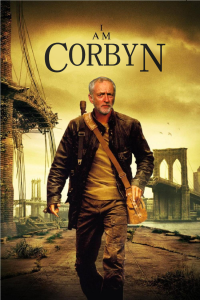 Corbyn’s margin of victory was impressive by any scale. No party leader in the history of UK politics has been elected by more votes than Mr Corbyn. Almost 430,000 votes were cast in the Labour leadership election. This compares to the roughly 210,000 votes cast in 2005 in the Conservative Leadership election. It all sounds pretty decisive. It therefore needs some further context. At the next general Election Labour would need something in the order of another 12.5 million votes just to win a bare majority. That is approximately 33% more than the 9 million or so Labour won in 2010 or 2015. The bar is set so very high because Labour cannot rely on picking-up many of the 40 seats lost in Scotland in 2015. Therefore, in order to win at all the party will need to win very big in England – and not just in the bits of England where it did well last time; or where it came close. One of the oddities of the last election was that at its end Labour had many seats with bigger majorities and so did the Conservatives. There are therefore many,many fewer marginal seats that might change hands on swings of 5% or less.
Corbyn’s margin of victory was impressive by any scale. No party leader in the history of UK politics has been elected by more votes than Mr Corbyn. Almost 430,000 votes were cast in the Labour leadership election. This compares to the roughly 210,000 votes cast in 2005 in the Conservative Leadership election. It all sounds pretty decisive. It therefore needs some further context. At the next general Election Labour would need something in the order of another 12.5 million votes just to win a bare majority. That is approximately 33% more than the 9 million or so Labour won in 2010 or 2015. The bar is set so very high because Labour cannot rely on picking-up many of the 40 seats lost in Scotland in 2015. Therefore, in order to win at all the party will need to win very big in England – and not just in the bits of England where it did well last time; or where it came close. One of the oddities of the last election was that at its end Labour had many seats with bigger majorities and so did the Conservatives. There are therefore many,many fewer marginal seats that might change hands on swings of 5% or less.
There will be 650 new constituencies next time around. They will all roughly be the same size. The exact impact of that cannot be known until the Boundary Commission does its work but, for example, if in 2020 Labour were to halve the UKIP vote it would not add more than a handful of MPs to the 238 it currently holds. Labour needs a whopping swing of 9.6% to win the barest majority in 2020. Only twice in its history has the Labour Party secured anything like a swing of that scale – 1945 and 1997. In both those cases the enormous swing gave Labour a landslide victory. Yet if repeated in 2020 that almost unprecedented swing would give Labour only a bare overall majority. Therefore, 12-13 million votes is its minimum target. That same number also happens to be roughly double the number of Union members. By way of contrast there were almost 13 million union members in the early 1980’s when Jeremy Corbyn first became an MP. That neatly summarises the journey the UK has taken in those 33 years. The question both for Labour (and by implication for the Unions who now largely bankroll the party) is can a Labour Party led by Jeremy Corbyn turn back the tide of history in a single election? Corbyn’s age means he will certainly only get a single chance at best to make this dream a reality.
The answer Corbynites give is that it can be done – there are lots of young voters and they are largely metropolitan voters. They are currently alienated from politics but could deliver many seats to Labour if they can be persuaded to register and vote in numbers. There are similarly swathes of working poor who have also tended over 25 years years not to register and therefore not to vote. The same argument applies to them as to young voters. It is said these two groups are disproportionately attracted to Corbyn and to his radical message. Finally, there are the lower paid blue and white collar voters (many in the public sector) who have done relatively badly from post 1980’s economic settlement and who have suffered most in financial terms in the aftermath of the financial crash of 2007-8. Again these might be mobilised in numbers which might overturn the patterns of previous elections. This theory rests on no hard statistical evidence and hard evidence is often the only thing that really counts when votes are counted on election night.
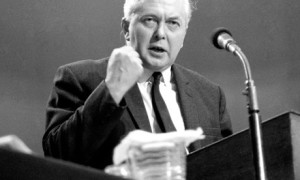 The last Labour leader to win the party crown from the left of the political centre – (and of the Labour party) – who successfully went on win a General Election was Harold Wilson. In 1963 many thought Harold Wilson was principled and modern. Later after repeated electoral success Wilson came to be loathed by the left – above all for his unprincipled pragmatism. In 1963 the ideas dominating the centre ground of politics were much more interventionist and collectivist than today. As it happens, many of Jeremy Corbyn’s economic policies might have been taken straight from the 1964 Let’s go with Labour manifesto. In this sense Corbyn and his shadow chancellor John McDonnell are not quite the Revolutionary hord at the proverbial gates of private property. Neither yet, however, are they quite the Rousseau or Voltaire of our age that some devotees have taken them to be.
The last Labour leader to win the party crown from the left of the political centre – (and of the Labour party) – who successfully went on win a General Election was Harold Wilson. In 1963 many thought Harold Wilson was principled and modern. Later after repeated electoral success Wilson came to be loathed by the left – above all for his unprincipled pragmatism. In 1963 the ideas dominating the centre ground of politics were much more interventionist and collectivist than today. As it happens, many of Jeremy Corbyn’s economic policies might have been taken straight from the 1964 Let’s go with Labour manifesto. In this sense Corbyn and his shadow chancellor John McDonnell are not quite the Revolutionary hord at the proverbial gates of private property. Neither yet, however, are they quite the Rousseau or Voltaire of our age that some devotees have taken them to be.
Strikingly, it is rather Corbyn’s defence, foreign and social policies that are children of the cultural and sexual revolution that reached its apogee in his youthful flowering in the 1970’s. As it happens Corbyn’s era was also mine. In that time many on the further left of the Labour Party flirted with deeply unfashionable minority causes. The causes of those times were also more complex than often portrayed in happy retrospect. For example some gay campaign groups inadvertently sheltered some suspect organisations – like the Paedophile Information Exchange. The same dubious connections existed in groups ostensibly supporting a United Ireland or a Palestinian Homeland which often had crossover members from the terrorist IRA and PLO organisations. Oppression makes strange bedfellows and the post 1960’s left made cause with many unfashionable minorities but sometimes it was a less than critical friend. As the political importance of the left dwindled in the repeated electoral failures of the 1980’s – bad causes became a left wing cause in their own right – George Galloway’s career perhaps illustrating the maverick worst of this left-leaning political narcissism. Galloway made common cause with all and sundry – even tyrants like Saddam Hussein.
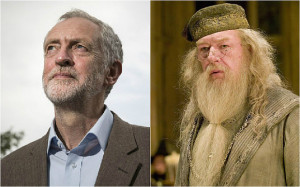 Throughout this time the politics of the left became more and more earnest.Overtly stern perhaps unintentionally dour – over often left wing politics sounded like an angry sermon from an evangelical pastor. If the language and style was a little archaic – shunning Media friendly soundbites beloved of contemporary politicians – it was also unfashionably and self-consciously high on “principles” and as often it inhaled deeply its own rhetoric and got even higher on “principles” as its influence waned within the Labour Party. Militant Tendency had spent its Revolutionary fervour in the barricades of endless party committees. The intellectual left had left them to it and instead pitched their tent in the Olympus of utopian socialism.The political air gets thin up in those dizzy heights and eventually it is hard to do anything more than dream idealsitic dreams.
Throughout this time the politics of the left became more and more earnest.Overtly stern perhaps unintentionally dour – over often left wing politics sounded like an angry sermon from an evangelical pastor. If the language and style was a little archaic – shunning Media friendly soundbites beloved of contemporary politicians – it was also unfashionably and self-consciously high on “principles” and as often it inhaled deeply its own rhetoric and got even higher on “principles” as its influence waned within the Labour Party. Militant Tendency had spent its Revolutionary fervour in the barricades of endless party committees. The intellectual left had left them to it and instead pitched their tent in the Olympus of utopian socialism.The political air gets thin up in those dizzy heights and eventually it is hard to do anything more than dream idealsitic dreams.
Then over their high mountain and without any warning marched young General Tony Blair – a latter day Hannibal – leading the elephants of New Labour in a violent rampage over the low lying centre ground of politics. He had outflanked those to his left and to his right. The lofty dreams of the left overnight became a nightmare of political compromise and fiscal obfuscation. The Blair-Brown project was redistribution of wealth by stealth. Even they were surprised at its success. Their tactics of their campaigns were borrowed from the political game plan of Bill Clinton’s New Democrats. There was a genius to it but it always had its naysayers.
Like Thatcher, Blair’s bitterest enemies were always within his party. Today’s hatred of Blair is just as irrational as the adulation that once was his. Grave though his foreign policy failures may be taken to be Blair’s greatest crime in the eyes of those who hate him was his chumminess with George W. Bush. No one complained about his equally close and personal friendship with Bill Clinton or indeed the even apparently more illegal intervention of NATO in Kosovo. Indeed, after Kosovo, Blair’s speech in Chicago on the remit and reach of post Cold War foreign policy was rapturously received on all sides. The rationale for actions later to be taken in the case of Iraq was set out in that speech. Blair’s doctrine was a worthy successor to Truman’s. It was global. Moreover it was also in the tradition of Churchill’s ‘Iron Curtain’ speech in Fulton Missouri in 1946. In Chicago Blair made the case for an activist foreign policy that the leader of the senior partner in the NATO alliance – the USA – was unable to make for political reasons. Monica Lewinsky and her infamous dress caused Bill Clinton’s impeachment. His domestic arrangements had international consequences and one of them was to make Tony Blair the US administration’s unofficial official spokesman on foreign affairs.
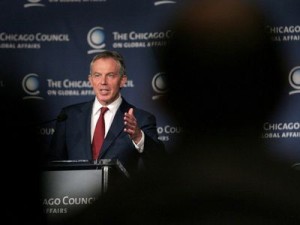 The principles of foreign policy enunciated by Blair later were effectively endorsed in the General Election landslide of 2001. Strange to recall now from this retrospect that then in 2001 the left wing of the Labour Party was curiously happiest with Blair’s interventionist internationalism. Claire Short’s Department of International Development was seen as one of the genuinely ‘left wing‘ things done by New Labour. The shambles of Iraq and the questions of weapons of mass destruction aroused strong anti-war sentiment and men like Jeremy Corbyn came into their own once more – though initially the LibDems under the late Charles Kennedy were the electoral beneficiaries. New Labour began its inglorious retreat under relentlessly hostile fire from within and without the Labour Party. The poison of Iraq gradually seeped everywhere in the Labour movement and like acid it hollowed out the soft centre of Blairism. By the time of the financial crash New Labour was already pretty much a husk.
The principles of foreign policy enunciated by Blair later were effectively endorsed in the General Election landslide of 2001. Strange to recall now from this retrospect that then in 2001 the left wing of the Labour Party was curiously happiest with Blair’s interventionist internationalism. Claire Short’s Department of International Development was seen as one of the genuinely ‘left wing‘ things done by New Labour. The shambles of Iraq and the questions of weapons of mass destruction aroused strong anti-war sentiment and men like Jeremy Corbyn came into their own once more – though initially the LibDems under the late Charles Kennedy were the electoral beneficiaries. New Labour began its inglorious retreat under relentlessly hostile fire from within and without the Labour Party. The poison of Iraq gradually seeped everywhere in the Labour movement and like acid it hollowed out the soft centre of Blairism. By the time of the financial crash New Labour was already pretty much a husk.
Hindsight foreseeing all – in the end not even the scale of the Corbyn victory should have surprised. It was inevitable and even if it came more quickly than expected it had been a long time in the making. The social-democrat-ish flank of Labour – ascendant since 1994 – had not shown itself to own much political imagination and more surprisingly any political heft in the last decade. After the misplaced coronation of Gordon Brown as party leader in 2007 the dominant right in the PLP (Parliamentary Labour Party) repeatedly failed to deal with ‘leadership issues’. It was cowardly; and often as self-serving as it was timid. From 2008 until 2015 it left leaders in place who were bound to take the party down to terrible defeat. From before 1994 their rationale had been to win power by all means and to do so by compromising pragmatically on principled ends. It turned out they were really not that good a winning by all or any means.Therefore, when the time came this May neither of the two insiders – Burnham and Cooper – seemed to have much fresh to offer that offered Labour any hope of electoral success. Liz Kendall spoke home truths but no one was listening. Corbyn by way of contrast was a veritable Pied Piper. He appeared unaffected and refreshingly direct and even ambitious. He cast his spell far and wide.
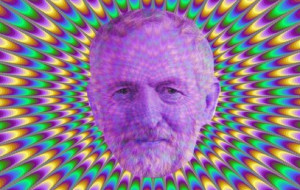 Therefore, Jeremy Corbyn’s time has come because his timing was perfect. He has also been lucky with his opponents. Most successful politicians always seem to enjoy the greatest (undeserved) luck. Ronald Reagan aptly demonstrated how charm may appear to transmute fool’s gold into the stuff from which dreams are made. Luck turned the bit actor on the B movie set into the lead on the world stage. Mrs Thatcher – after her apotheosis as PM in 1979 – was lucky in her unfortunate opponents. They always seemed doomed – first a voluble Michael Foot; then an even more voluble Neil Kinnock; both ever ready to talk themselves out of her job. Blair after his ascension to power in 1997 was also lucky in his opponents: first, hapless William Hague in his baseball cap; then coughing Ian Duncan Smith; then the sinister shades of Michael Howard. The election results of 1983 and 1987; and of 2001 and 2005 were almost preordained by Fate. And especially when in 1992 Major pulled of the fourth election win for the Conservatives in a row – and when in 2005, despite the Labour debacle over Iraq, voters were not quite able to abandon Blair.
Therefore, Jeremy Corbyn’s time has come because his timing was perfect. He has also been lucky with his opponents. Most successful politicians always seem to enjoy the greatest (undeserved) luck. Ronald Reagan aptly demonstrated how charm may appear to transmute fool’s gold into the stuff from which dreams are made. Luck turned the bit actor on the B movie set into the lead on the world stage. Mrs Thatcher – after her apotheosis as PM in 1979 – was lucky in her unfortunate opponents. They always seemed doomed – first a voluble Michael Foot; then an even more voluble Neil Kinnock; both ever ready to talk themselves out of her job. Blair after his ascension to power in 1997 was also lucky in his opponents: first, hapless William Hague in his baseball cap; then coughing Ian Duncan Smith; then the sinister shades of Michael Howard. The election results of 1983 and 1987; and of 2001 and 2005 were almost preordained by Fate. And especially when in 1992 Major pulled of the fourth election win for the Conservatives in a row – and when in 2005, despite the Labour debacle over Iraq, voters were not quite able to abandon Blair.
Politicians by profession overestimate their own long term importance. In that they are always far,far too earnest for their times. For those on the right of Labour it was these foreign policy and social issues more than the economics of fairness agenda that left them unpersuaded by Jeremy Corbyn. The other question Labour has to answer is how many of these Labour supporters will now feel disinclined to vote Labour in the next election – even if they do not vote for some other party. In short for every new voter Corbyn wins for Labour the relevant question is also – how many voters will he lose for Labour?
His first PMQ’s was over-hyped by a Media mad for a news line to follow. His refusal to play the game left an impression that he had wrong-footed Cameron. However, take a careful look at the questions others asked the PM that day. From Northern Ireland and elsewhere there were lots of questions that were pointed to Corbyn’s past. He might not choose to respond to them in the House of Commons to his advantage but these questions will persist and his past connections will be used against him.
Still no one can deny Jeremy Corbyn has certainly got attention – and not all of it in the bad sense. There is however no clear sign of a bounce in Labour’s polling. This is neither a Wilson nor a Blair moment. However both of them were elected when Conservative governments had already become deeply discredited. This government still basks in ratings several percentage points higher than on 8th May. Nevertheless, for whatever reason the Labour party has a spring in its step. Whether it will duly fall flat on its face has to be seen.
One of the oddest things about choosing one’s tribes in one’s life is that the choices made so very young often last a lifetime. This is peculiarly true of politics.The reason the Media pays so much attention to politicians changing party is precisely because it is not that usual. I chose my tribe in my early teens in the early days of the first Wilson government. It caused the first memorable adult row with my dad over Sunday lunch. Later mum, with dad gone, herself came-out as a Labour supporter. It was I guess partly also Catholic thing – the idea of the Social Gospel was very fashionable in Catholic intellectual circles after World War II. Catholics of that generation were encouraged to be very engaged by the causes of poverty and the need to address it. That itself was partly a response to the philosophical challenge posed by the rise of socialism in the late nineteenth and early twentieth century.
My Catholic grammar schoolmates and I also talked politics on the train to and from school in Reading. As we grew up they grew more Conservative but I stuck with Labour and Mr Wilson. As fashions changed in the Labour Party I remained pragmatically convinced that only Labour in government mattered. I was never even in my heady undergraduate days attracted to the left of Labour – soft or hard. I was never read the Tribune. I stuck with the Guardian and New Statesman By the time I got to Leeds, Student Union President Jack Straw had moved on to greater things but even then I regarded Jack Straw as too far to the woolly left.
So it can be seen I’ve been unimaginatively faithful to my early adolescent ideals and my political tribe. Now I am forced to consider it – I’ve also shown the same unimaginative fidelity to my other early tribal loyalties – Irish; Catholic; and Gay.
The same cannot be said of the electorate. Since the 1960’s voters – always apt to have their heads turned by any passing political fashion. They have indeed become serial political philanderers. There are many reasons for this heightened promiscuity and its fact gives hope to all politicians. For Jeremy Corbyn’s many supporters this is a moment of intoxicating hope.They earnestly believe Jeremy Corbyn and John McDonnell offer something different. Principled;authentic; honest – Corbyn and his ilk have earnestly preached this message all along. The problem with sermons is their sentiments often meet with approval but they rarely change behaviours or truly change hearts. In the longer run in political theatre is show business and speaks many parts. The voters want to be entertained more than improved. Therein lies the terrible truth about the impotence of being earnest. Meanwhile the best advice for old cynics like me perhaps is to keep our own counsel or perhaps even better….with apologies to Wilde..

